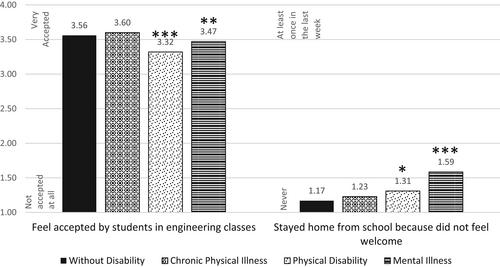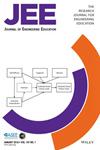Engineering ableism: The exclusion and devaluation of engineering students and professionals with physical disabilities and chronic and mental illness
Abstract
Background
The experiences of students and professionals with disabilities are routinely excluded from scholarly and policy debates about equity in engineering. Emergent research suggests that engineering is particularly ableist, yet systematic accounts of the possible exclusion and devaluation faced by engineers with disabilities are largely missing.
Purpose/Hypothesis
This paper asks, do engineers with disabilities have more negative interpersonal experiences in engineering classrooms and workplaces than those without disabilities? Utilizing a social relational model of disability, I hypothesize that engineers with physical disabilities and chronic and mental illness are more likely to experience exclusion and professional devaluation than their peers and, partly as a result, have lower persistence intentions.
Data/Methods
The paper uses survey data from 1729 students enrolled in eight US engineering programs (American Society for Engineering Education Diversity and Inclusion Survey) and 8321 US-employed engineers (Science, Technology, Engineering, and Math Inclusion Study Survey). Analyses use regression, mediation, and intersectional approaches.
Results
Consistent with expectations, engineering students and professionals with disabilities are less likely than their peers to experience social inclusion and professional respect at school and work. Students with disabilities are more likely to intend to leave their engineering programs and professionals with disabilities are more likely to have thought about leaving their engineering jobs compared to peers, and their greater risks of encountering interpersonal bias help account for these differences. Analyses also reveal intersectional variation by gender and race/ethnicity.
Conclusion
These results suggest that engineering harbors widespread ableism across education and work. The findings demand more scholarly attention to the social, cultural, and physical barriers that block people with disabilities from full and equal participation in engineering.


 求助内容:
求助内容: 应助结果提醒方式:
应助结果提醒方式:


